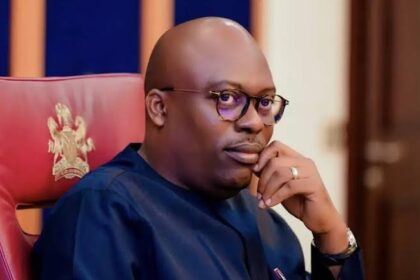Vice President Yemi Osinbajo yesterday reaffirmed the Federal Government’s position to resist pressure to devalue the naira.
But former Central Bank of Nigeria (CBN) Governor, Joseph Sanusi, faulted the government’s stand and said it was merely postponing the evil day.
Both spoke at a town hall meeting in Lagos which the Vice President held with his co-tenants in the Victoria Garden City (VGC) in the Lekki-Epe axis of Lagos.
The VP declared at the well attended session that devaluation was not on the card at all.
He explained that the administration’s policy was to “come up with a flexible exchange rate to be supported by strong monetary policies” and the objective was to stop unnecessary consumption of imported goods and promote local manufacturing.
However, Chief Sanusi, a VGC resident, advised the government to either devalue the currency or stop the confusion between the official and parallel market exchange rates.
He said allowing an official rate at N197 per dollar while the parallel market goes for over N300 was “distractive”.
“Naira is already devalued and government not accepting it is postponing the evil day,” he said.
Vice President also said at the forum that the Buhari Administration met a falling revenue profile in May 2015, which was down by about 70 per cent compared to the same period of the preceding year.
He said that in spite of the high cost of about $22 to produce a barrel of crude oil now selling at about $33 dollars, at least 38 per cent of the foreign reserve was spent on importing petroleum products.
He also said the previous administration was spending about N20 billion on food importation annually, which reduced the nation’s foreign reserve drastically from about $40 billion to about $25 billion.
He said government was now poised to diversify the economy by investing heavily in agriculture and solid minerals production with a view to making the country self-sufficient in rice, poultry and palm oil production as well as developing the entire agriculture value chain to create wealth and jobs for the teeming youth.
The vice president further said the administration was targeting 2018 for complete reliance on refined petroleum products, adding that the petrochemical industry, railway infrastructure and provision of other infrastructure were top on the priority list of government.
On the Boko Haram insurgency, he said the terror sect had been degraded as a “military might” although pockets of suicide bombings still take place.
“This is a challenge we must tackle going forward but the other challenge is the over two million people displaced by insurgency who need resettlement,” he said.
He said government plans to re-settle the people back to their farming occupation first, but that would be after the entire North East land would have been de-mined.
He said government was mindful also of the agitation by the Indigenous People of Biafra (IPOB), pipeline vandalism in the South-South and the Fulani- farmers clash in some communities, all which pose security threats.
The Chairman of the VGC Residents Association, Olusegun Ladega, requested Vice President Osinbajo to intervene in the flooding of the estate caused by the non-provision of ancillary drainage on the Lekki-Epe Expressway by the Lagos State Government.
Another resident, Tochi Okwor, raised concerns about the high rate of communicable diseases, such as TB and HIV and AIDS, which she said might reach unacceptable proportion if nothing was done.
She also advised the federal government to remove the Nigeria Centre for Disease Control (NCDC) from the Health Ministry and make it an independent organisation to enable the NCDC play its role effectively.


